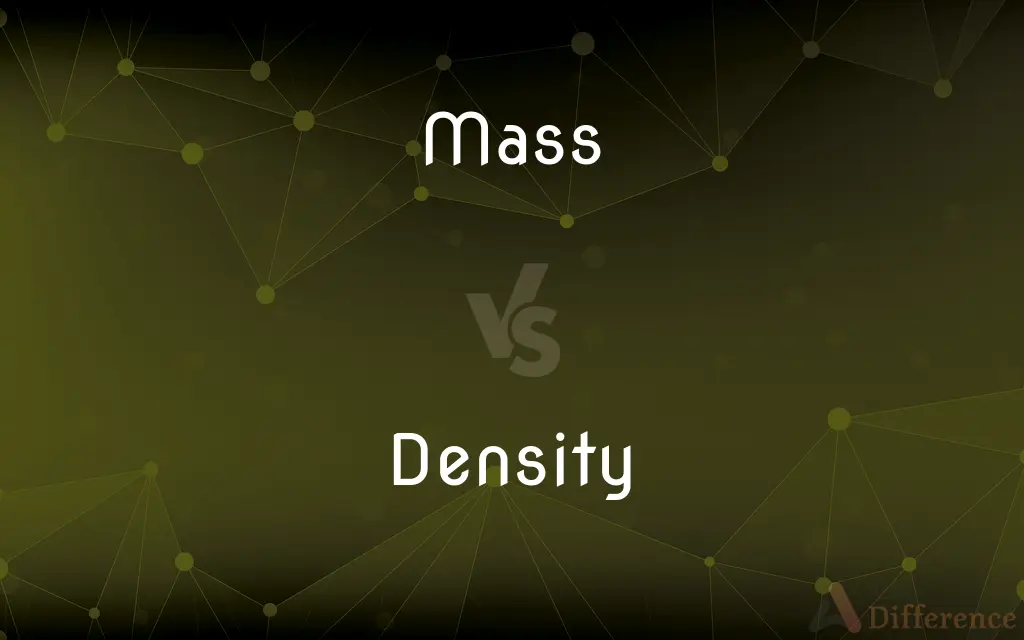Mass vs. Density — What's the Difference?
Edited by Tayyaba Rehman — By Fiza Rafique — Updated on October 11, 2023
Mass is the amount of matter in an object, whereas Density is the measure of how much mass is packed into a given volume.

Difference Between Mass and Density
Table of Contents
ADVERTISEMENT
Key Differences
Mass and Density are fundamental concepts in physics that describe different aspects of matter. Mass refers to the quantity of matter in an object, independent of its volume or the space it occupies. It's a scalar quantity, which means it has magnitude but no direction. Density, on the other hand, is a measure of how tightly the mass of an object is packed into a certain space. It is defined as mass per unit volume.
Both Mass and Density are essential for understanding various physical phenomena. For instance, when you weigh yourself on a scale, you're measuring your mass. This mass remains constant whether you're on Earth, the Moon, or floating in space. Density, meanwhile, explains why objects float or sink in liquids. If an object has a higher density than the liquid it is placed in, it will sink. Conversely, if it has a lower density, it will float.
Mass is usually measured in kilograms (kg) or grams (g) using a balance or scale. It is an intrinsic property, meaning the mass of an object doesn't change based on its location or conditions around it. Density, however, can vary based on external conditions. For example, the density of a gas can change with temperature or pressure, whereas a solid's density is generally more constant.
To understand the relationship between Mass and Density, consider the equation: Density = Mass/Volume. This equation signifies that density is derived from the mass of an object divided by its volume. Therefore, two objects of the same volume but different masses will have different densities.
Comparison Chart
Definition
Amount of matter in an object.
Mass of an object per unit volume.
ADVERTISEMENT
Measurement Units
Kilograms (kg), grams (g).
Kilograms per cubic meter (kg/m^3), grams per cubic centimeter (g/cm^3).
Determines
Weight of an object (when acted upon by gravity).
Whether an object will float or sink in a liquid.
Change with Location
Remains constant.
Can vary (especially in gases with temperature/pressure changes).
Intrinsic/Extrinsic
Intrinsic property.
Extrinsic (depends on mass and volume).
Compare with Definitions
Mass
A large number or quantity.
A mass of people gathered to watch the parade.
Density
The number of individuals in a specific area.
The population density of the city is 10,000 people per square mile.
Mass
The main portion or body of something.
The mass of the iceberg remained underwater.
Density
The opacity or relative ability to reflect light of a translucent medium.
The density of the fog made it hard to see.
Mass
A liturgical celebration in the Christian Church.
She attended mass every Sunday.
Density
A measure of mass per unit of volume.
The density of water is 1 g/cm^3.
Mass
Mass is both a property of a physical body and a measure of its resistance to acceleration (rate of change of velocity with respect to time) when a net force is applied. An object's mass also determines the strength of its gravitational attraction to other bodies.
Density
The degree of compactness of a substance.
The metal had a high density, making it very heavy for its size.
Mass
The celebration of the Christian Eucharist, especially in the Roman Catholic Church
We went to Mass
Density
The quantity of something in a particular area.
The forest had a high density of trees.
Mass
Involving or affecting large numbers of people or things
A mass exodus of refugees
The film has mass appeal
Density
The density (more precisely, the volumetric mass density; also known as specific mass), of a substance is its mass per unit volume. The symbol most often used for density is ρ (the lower case Greek letter rho), although the Latin letter D can also be used.
Mass
Assemble or cause to assemble into a single body or mass
Both countries began massing troops in the region
Clouds massed heavily on the horizon
Density
The quality or condition of being dense.
Mass
Public celebration of the Eucharist in the Roman Catholic Church and some Protestant churches.
Density
The quantity of something per unit measure, especially per unit length, area, or volume.
Mass
The sacrament of the Eucharist.
Density
The mass per unit volume of a substance under specified conditions of pressure and temperature.
Mass
A musical setting of certain parts of the Mass, especially the Kyrie, Gloria, Credo, Sanctus, and Agnus Dei.
Density
(Computers) A measure of the number of bits that can be stored in a given amount of physical space on a storage medium.
Mass
A unified body of matter with no specific shape
A mass of clay.
Density
The number of individuals, such as inhabitants or housing units, per unit of area.
Mass
A grouping of individual parts or elements that compose a unified body of unspecified size or quantity
"Take mankind in mass, and for the most part, they seem a mob of unnecessary duplicates" (Herman Melville).
Density
The degree of optical opacity of a medium or material, as of a photographic negative.
Mass
A large but nonspecific amount or number
A mass of bruises.
Density
Thickness of consistency; impenetrability.
Mass
A lump or aggregate of coherent material
A cancerous mass.
Density
Complexity of structure or content.
Mass
The principal part; the majority
The mass of the continent.
Density
Stupidity; dullness.
Mass
The physical volume or bulk of a solid body.
Density
(physics) A measure of the mass of matter contained by a unit volume.
Mass
Abbr. m(Physics) A property of matter equal to the measure of the amount of matter contained in or constituting a physical body that partly determines the body's resistance to changes in the speed or direction of its motion. The mass of an object is not dependent on gravity and therefore is different from but proportional to its weight.
Density
The ratio of one quantity, representing something of interest, to another quantity representing space, area, or extent in which the thing of interest is distributed.
The number of particles per unit volume of a specified volume can be considered to be the particle density for the specified volume.
Mass
An area of unified light, shade, or color in a painting.
Density
The probability that an outcome will fall into a given range, per unit of that range; the relative likelihood of possible values of a continuous random variable.
Mass
(Pharmacology) A thick, pasty mixture containing drugs from which pills are formed.
Density
Stupidity; denseness.
Mass
Masses The body of common people or people of low socioeconomic status
"Give me your tired, your poor, / Your huddled masses yearning to breathe free" (Emma Lazarus).
Density
The quality of being dense, close, or thick; compactness; - opposed to rarity.
Mass
To gather or be gathered into a mass.
Density
The ratio of mass, or quantity of matter, to bulk or volume, esp. as compared with the mass and volume of a portion of some substance used as a standard.
Mass
Of, relating to, characteristic of, directed at, or attended by a large number of people
Mass education.
Mass communication.
Density
Depth of shade.
Mass
Done or carried out on a large scale
Mass production.
Density
The amount per unit size
Mass
Total; complete
The mass result is impressive.
Density
The spatial property of being crowded together
Mass
(physical) Matter, material.
Mass
A quantity of matter cohering together so as to make one body, or an aggregation of particles or things which collectively make one body or quantity, usually of considerable size.
Mass
(obsolete) Precious metal, especially gold or silver.
Mass
(physics) The quantity of matter which a body contains, irrespective of its bulk or volume. It is one of four fundamental properties of matter. SI unit of mass: kilogram.
Mass
(pharmaceutical drug) A medicinal substance made into a cohesive, homogeneous lump, of consistency suitable for making pills; as, blue mass.
Mass
(medicine) A palpable or visible abnormal globular structure; a tumor.
Mass
(bodybuilding) Excess body weight, especially in the form of muscle hypertrophy.
Mass
(proscribed) weight
Mass
A large quantity; a sum.
Mass
Bulk; magnitude; body; size.
Mass
The principal part; the main body.
Mass
A large body of individuals, especially persons.
The mass of spectators didn't see the infraction on the field.
A mass of ships converged on the beaches of Dunkirk.
Mass
(in the plural) The lower classes of persons.
The masses are revolting.
Mass
(Christianity) The Eucharist, now especially in Roman Catholicism.
Mass
(Christianity) Celebration of the Eucharist.
Mass
The sacrament of the Eucharist.
Mass
A musical setting of parts of the mass.
Mass
(transitive) To form or collect into a mass; to form into a collective body; to bring together into masses; to assemble.
Mass
(intransitive) To assemble in a mass
Mass
To celebrate mass.
Mass
Involving a mass of things; concerning a large quantity or number.
There is evidence of mass extinctions in the distant past.
Mass
Involving a mass of people; of, for, or by the masses.
Mass unemployment resulted from the financial collapse.
Mass
The sacrifice in the sacrament of the Eucharist, or the consecration and oblation of the host.
Mass
The portions of the Mass usually set to music, considered as a musical composition; - namely, the Kyrie, the Gloria, the Credo, the Sanctus, and the Agnus Dei, besides sometimes an Offertory and the Benedictus.
Mass
A quantity of matter cohering together so as to make one body, or an aggregation of particles or things which collectively make one body or quantity, usually of considerable size; as, a mass of ore, metal, sand, or water.
If it were not for these principles, the bodies of the earth, planets, comets, sun, and all things in them, would grow cold and freeze, and become inactive masses.
A deep mass of continual sea is slower stirredTo rage.
Mass
A medicinal substance made into a cohesive, homogeneous lump, of consistency suitable for making pills; as, blue mass.
Mass
A large quantity; a sum.
All the mass of gold that comes into Spain.
He had spent a huge mass of treasure.
Mass
Bulk; magnitude; body; size.
This army of such mass and charge.
Mass
The principal part; the main body.
Night closed upon the pursuit, and aided the mass of the fugitives in their escape.
Mass
The quantity of matter which a body contains, irrespective of its bulk or volume.
Mass
To celebrate Mass.
Mass
To form or collect into a mass; to form into a collective body; to bring together into masses; to assemble.
But mass them together and they are terrible indeed.
Mass
The property of a body that causes it to have weight in a gravitational field
Mass
(often followed by `of') a large number or amount or extent;
A batch of letters
A deal of trouble
A lot of money
He made a mint on the stock market
It must have cost plenty
Mass
An ill-structured collection of similar things (objects or people)
Mass
(Roman Catholic Church and Protestant Churches) the celebration of the Eucharist
Mass
A body of matter without definite shape;
A huge ice mass
Mass
The common people generally;
Separate the warriors from the mass
Power to the people
Mass
The property of something that is great in magnitude;
It is cheaper to buy it in bulk
He received a mass of correspondence
The volume of exports
Mass
A musical setting for a Mass;
They played a Mass composed by Beethoven
Mass
A sequence of prayers constituting the Christian eucharistic rite;
The priest said Mass
Mass
Join together into a mass or collect or form a mass;
Crowds were massing outside the palace
Mass
Occurring widely (as to many people);
Mass destruction
Mass
Gathered or tending to gather into a mass or whole;
Aggregate expenses include expenses of all divisions combined for the entire year
The aggregated amount of indebtedness
Mass
The quantity of matter in an object.
The mass of the ball was 2 kilograms.
Mass
A coherent body of matter with no specific shape.
The mass of clouds in the sky hinted at an approaching storm.
Common Curiosities
Does an object's Mass change depending on its location, like on Earth versus the Moon?
No, an object's mass remains constant regardless of its location.
How is Density commonly defined in scientific terms?
Density is defined as the mass of an object divided by its volume.
What is the basic definition of Mass in physics?
Mass refers to the amount of matter contained in an object.
What are the standard units for measuring Mass in the metric system?
Mass is typically measured in kilograms (kg) or grams (g).
Why is Density an important concept in fields like engineering and architecture?
Understanding density helps professionals choose the right materials for specific purposes, ensuring safety and functionality.
How is Density related to an object's ability to float in a liquid?
Objects with a density less than the liquid will float, while those with a higher density will sink.
How does altitude or depth affect the Density of air or water respectively?
As altitude increases, air density decreases due to less atmospheric pressure. Similarly, as depth increases in water, its density increases due to increased pressure.
How is Density typically expressed for solids and liquids?
Density for solids and liquids is often expressed in grams per cubic centimeter (g/cm^3) or kilograms per cubic meter (kg/m^3).
Are Mass and weight the same thing?
No, while mass is the amount of matter in an object, weight is the force of gravity acting on that mass.
How does Density affect the behavior of substances in mixtures?
In a mixture, substances with lower densities tend to rise above those with higher densities.
Can two objects have the same Mass but different densities?
Yes, if the two objects have different volumes, they can have the same mass but different densities.
Can the Density of an object change under different conditions?
Yes, especially for gases, density can change with variations in temperature and pressure.
If you have two objects of the same volume but different masses, which one has higher Density?
The object with the greater mass will have the higher density.
What role does Density play in natural phenomena like ocean currents?
Differences in density, due to temperature and salinity variations, drive the movement of ocean currents. Warmer, less dense water rises, while colder, denser water sinks, creating a flow.
Is Mass a scalar or a vector quantity?
Mass is a scalar quantity, meaning it only has magnitude and no direction.
Share Your Discovery

Previous Comparison
Grinded vs. Ground
Next Comparison
Polling vs. InterruptAuthor Spotlight
Written by
Fiza RafiqueFiza Rafique is a skilled content writer at AskDifference.com, where she meticulously refines and enhances written pieces. Drawing from her vast editorial expertise, Fiza ensures clarity, accuracy, and precision in every article. Passionate about language, she continually seeks to elevate the quality of content for readers worldwide.
Edited by
Tayyaba RehmanTayyaba Rehman is a distinguished writer, currently serving as a primary contributor to askdifference.com. As a researcher in semantics and etymology, Tayyaba's passion for the complexity of languages and their distinctions has found a perfect home on the platform. Tayyaba delves into the intricacies of language, distinguishing between commonly confused words and phrases, thereby providing clarity for readers worldwide.














































